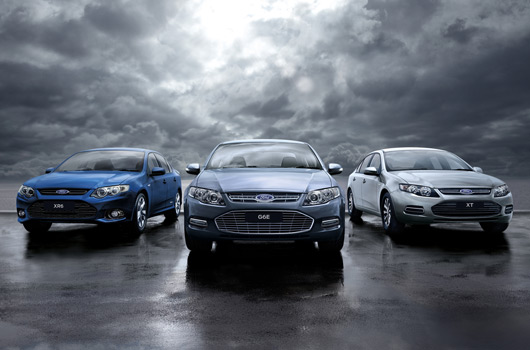Wheels Magazine reports that Ford Australia is about to announce the closure of its operations and rely on imported models only. Apparently a statement will be made at 9:15 10:45 this morning.
ABC radio says it understands Ford Australia’s local production will cease in 2016. Cars Guide is also running a story which states:
Ford was due to release its financial results today but News Limited has been told the media conference is about “more than thatâ€.
Confidential sources say that Ford Australia will become an import-only brand. It is unclear when the factories will close but Ford was due to introduce a facelifted Falcon and Territory next year.
Declining sales, which are showing no signs of improvement, are believed to be the main factor behind the decision. Closure of the Broadmeadows and Geelong factories will result in hundreds of job losses.
[Source: Wheels Magazine]
UPDATE: Confirmation from Ford Australia has come through.
Ford Australia’s press portal currently describes themselves like this:
Ford Motor Company
Ford vehicles have been sold in Australia since 1904. Growing demand for Ford vehicles led to the establishment of the Ford Motor Company of Australia on March 31, 1925.
Ford began production of the Falcon in 1960 – a nameplate which continues to this day. Ford Australia directly employs around 3,100 people in design, engineering, development, sales, administration, manufacturing and assembly facilities across Australia. Based at its Australian headquarters in Broadmeadows, on the northern outskirts of Melbourne, Ford’s assembly plant produces Falcon sedan, Falcon Ute, Territory and FPV variants on the one assembly line.
Ford’s Stamping, Casting and Engine plants are located in Geelong – 70km southwest of Melbourne. The Ford Proving Ground, located at You Yangs near Geelong, comprises a state-of-the-art vehicle testing and durability facility, complete with an Emissions Laboratory, Environmental Wind Tunnel and test tracks.
Ford markets a full range of passenger and light commercial vehicles. In addition to the local Falcon and Territory vehicle lines, Ford imports the Fiesta, Focus and Mondeo, along with the Kuga SUV. Light commercial vehicle imports include the Ranger and the Transit.
Ford in Australia
- Ford sold a total of 91,243 vehicles during 2011, ranking as the third largest vehicle reseller in Australia
- Ford directly employs around 3,100 people in Broadmeadows, Geelong and its five regional offices
- Ford’s Design and Engineering Centres based in Australia are centres of excellence for the Asia Pacific and Africa (APA) Region.
Geelong Automotive Manufacturing Operations:
Established in 1925, the Geelong AMO includes the Engine Plant, Casting Plant, Stamping Plant and Ford APA’s Product Engineering Office (including the Proving Ground at the You Yangs), which is responsible for the design, development and testing of current and future Ford models for Australia and overseas markets.
Broadmeadows Car Assembly Plant:
Established in 1960, the Broadmeadows Car Assembly Plant was opened by then Prime Minister, Sir Robert Menzies – eight generations of Falcon have been produced since the plant opened.
Additional facilities located at the Broadmeadows site are Ford Australia’s Head Office, Ford APA’s Design, Research, Engineering & Technology Centres, Ford Australia’s Customer Service Division and Training Centre.

4 replies on “Ford Australia to cease local production?”
Disaster. The Falcon (by all accounts) is a good car, but just too damn big. ‘Large’ cars of 20-30 years ago are about the size of a Mazda3 today – the sales charts are no coincidence.
I guess it’s lucky no taxpayers’ money was wasted…
Hmm…well, dinosaurs need to evolve &adapt, and none of the Australian mfrs have been particularly adept at this. So they’re not building what the market wants…economics 101.
It now takes a decent sized market to support the development of new models, and Australia is — and will always be — too small.
So, yes…it’s sad. But the fact is that Australians, as taxpayers and car buyers, have paid a very hefty price to support a fundamentally uneconomic activity. One can only speculate what other industries might have developed and flourished had the $billions that have gone into supporting car manufacturing over just the last 20 years had instead been left in the hands of buyers and taxpayers. That’s equally sad, in my opinion.
In contrast to the 2011 sales figures above, this is how Ford ranked in 2012:
Toyota (218,176)
Holden (114,665)
Mazda (103,886)
Hyundai (91,536)
Ford (90,408)
Nissan (79,747)
The only Ford ranked in the top 10 sales by model was the Focus (18,586), tenth, and it sold less than half of the top selling model in 2012, the Mazda3 (44,128).
Those sales figures don’t lie. Where was the Falcon?